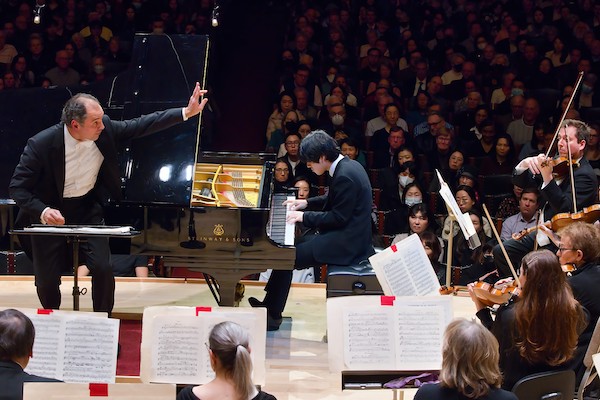Concert Review: Yunchan Lim — The BSO Brings in a Pianist to Watch
By Aaron Keebaugh
Pianist Yunchan Lim struck an arresting balance between thunderous drama and filigreed lyricism as he tackled Rachmaninoff’s knuckle-busting score.

Pianist Yunchan Lim makes his Boston Symphony debut playing Rachmaninoff, conducted by Tugan Sokhiev. Photo: Hilary Scott
“How is this even possible?” ran a comment beneath a YouTube video of pianist Yunchan Lim.
The viewer was no doubt referring to the then 18-year-old pianist’s ease of musical command over the poetic and the muscular, his mastery of elements that made his performance of Rachmaninoff’s Piano Concerto No. 3 — the subject of the video — the winning performance of the 2022 Van Cliburn International Piano Competition.
Since being proclaimed the elite competition’s youngest-ever champion, Lim has seen his star rise swiftly. He has appeared as soloist with top international orchestras, all while still completing his studies at the New England Conservatory. This past weekend his tour brought him back to Boston to play Rachmaninoff’s Third with the Boston Symphony Orchestra, led by Tugan Sokhiev.
Lim struck an arresting balance between thunderous drama and filigreed lyricism as he tackled Rachmaninoff’s knuckle-busting score. His tone was crystalline, his technique fiery. Still, he never resorted — like so many young pianists do — to self-indulgence. Climactic points resounded forcefully with no hint of expressive distortion and he was equally capable of conjuring a distant glow from the keyboard in the concerto’s chamber-like passages.
In the softer moments, Lim led as much as laid back. His arpeggios in the first movement gently underscored the French horn and woodwind solos that Sokhiev teased from the orchestra. At other spots, Lim employed his nuanced technique to colorful effect — his scales blurred in a wash of color that splashed against the dark strings.
Sokhiev proved an effective musical partner in the delicate passages, weaving a bed of sound that supported Lim’s adroit see-sawing between grace and precision. But the conductor didn’t always deliver the rapt intensity when it was called for. Lim’s almost percussive approach in the climactic moments were barely echoed in the orchestra. In all, the effect resembled a detailed portrait cast on a dull background.
Despite this, the soloist dazzled via his show-stopping virtuosity. Lim delivered power and assurance, weight as well as crispness. And the music swept up and down in all the right places. The second movement was a bold journey through the darkness ; the impish finale bounded along with blaze and panache.With the coolness of a seasoned performer, Lim’s hands’ traversed the chiaroscuro polarities of Rachmaninoff’s concerto.
His encore, Chopin’s Etude, Op. 25, No. 7, proved that Lin is equally capable of quiet reflection, his performance was simultaneously pearly, tender, and deeply felt.
The concert’s second half was dedicated to a rarity, composer Ernest Chausson’s Symphony in B-flat.
Chausson was born into privilege, so he never had to make a living with his music. (He died at the age of 44 in 1899 due to a bicycle accident.) Economic freedom gave him ample time to hone his craft with regard to its substance as well as form. His only symphony pays debts to César Franck as well as Richard Wagner; its themes are transformed organically over the course of thirty minutes.
The symphony was once popular; Charles Munch championed the composition during his tenure with the BSO. But over the past half-century the piece has only graced the orchestra’s programs twice — in 1962 and, before last weekend, in 1993.
Friday’s welcome revival served up a winning combination of subtlety and long-breathed grandeur. Through all that, Sokhiev struck a majestic presence, physically as well as musically. His smooth-waving gestures teased the intensity from the strings in the first movement; quick flicks of the wrist drew out supple, darting attacks. Thankfully, he drew attention to these and other colorful details without micromanaging the big picture out of earshot. Rather, the lines unfolded naturally: this reading was defined by an inviting warmth and grandeur. And the resulting performance was flexible yet quietly urgent. At the BSO and elsewhere, the symphony has been slotted as a musty gem of French Romanticism. But Sokhiev and the orchestra cast it in an admiring light that revealed the symphony’s still-dazzling sparkle and luster. Let’s hope it doesn’t take another thirty years for the work to be played here again.
Aaron Keebaugh has been a classical music critic in Boston since 2012. His work has been featured in the Musical Times, Corymbus, Boston Classical Review, Early Music America, and BBC Radio 3. A musicologist, he teaches at North Shore Community College in both Danvers and Lynn.

Amazing performance.. Excellent review..